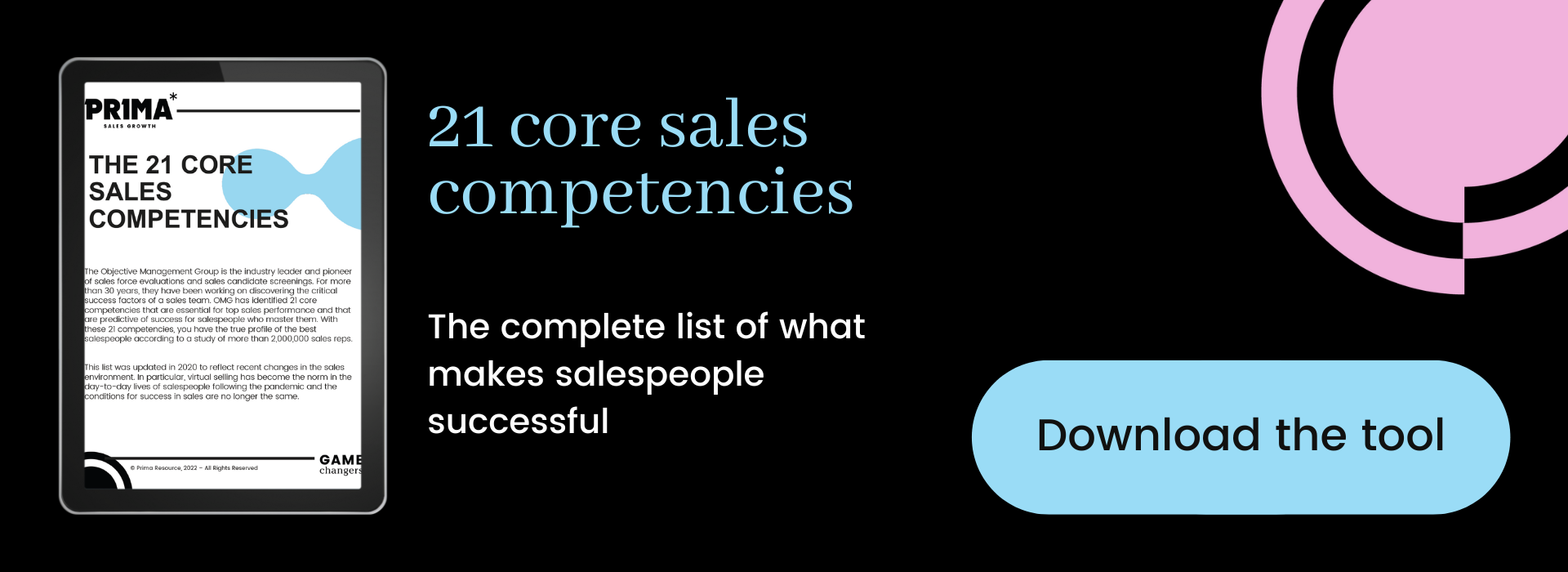
When sales are good, but profitability stagnates, sales leaders need to identify the hidden – and often root – causes that affect the sales force and impact profitability.
Pricing policies can lead to lower margins. However, above all, factors linked to a salesperson’s Sales DNA can have the most significant impact on margins.
That’s because Sales DNA has nothing to do with sales skills and technical competencies. Some representatives have a lot of technical and theoretical knowledge but just can’t put it into practice. This inability is the result of a Sales DNA problem.
In other words, the main obstacle to the salesperson’s success is him or herself and their deep-rooted sales beliefs.
What are the elements of Sales DNA?
- No need for approval
- Control of emotions
- Supportive beliefs
- Supportive buy cycle
- Comfort discussing money
- Handling rejection
What’s the need for approval?
When a salesperson needs to be liked, it prevents him or her from asking questions, pushing back and challenging conventional thinking.
The need for approval is not specific to sales; it’s a question of personal growth and development. It’s a primal need, and without this instinct, our capacity to survive as a species would inevitably be affected. We surround ourselves with family and friends. We want to please them and be pleased in return.
It’s normal to want approval and to need to feel loved.
A person’s need for approval has an impact on all of their relationships; positive if moderate, negative if situated in either extreme. Many books have been written on this particular subject, describing the impact that too high a need for approval has on relationships.
It’s unhealthy, even harmful, to put such high importance on another person’s validation.
In sales, issues arise when a salesperson looks for validation in the wrong places. Sales performance is affected when a sales representative looks for this validation in clients and prospects.
According to Objective Management Group (OMG), 62% of salespeople need approval, so there’s a fair chance that most of your department is struggling with this.

How do controlling emotions impact sales?
A salesperson must be able to stay in the moment, not in their head, to use active listening skills.
In sales, an emotional control means having the ability to stay firmly anchored in the moment no matter what the prospect says or does. Regardless of what they hear, a rep who’s able to control emotions is never surprised by a question or comment from the prospect.
A lack of control isn’t always apparent because a rep loses his/her temper or shows their emotions. Some salespeople lack of emotional control will push them in the other direction… they’ll retract inwards, stop talking and stop interacting which prevents them from staying in the moment.
The lack of emotional control affects 64% of representatives according to OMG’s findings, so there is a good chance your team is affected.

What are a salesperson’s supportive sales beliefs?
A salesperson’s collections of sales beliefs that support, rather than sabotage ideal outcomes make up their “supportive belief” sales competency.
Limiting sales beliefs are statements accumulated by sales representatives over time through observation and experience. They are firmly entrenched in 86% of salespeople and are detrimental to their sales performance.
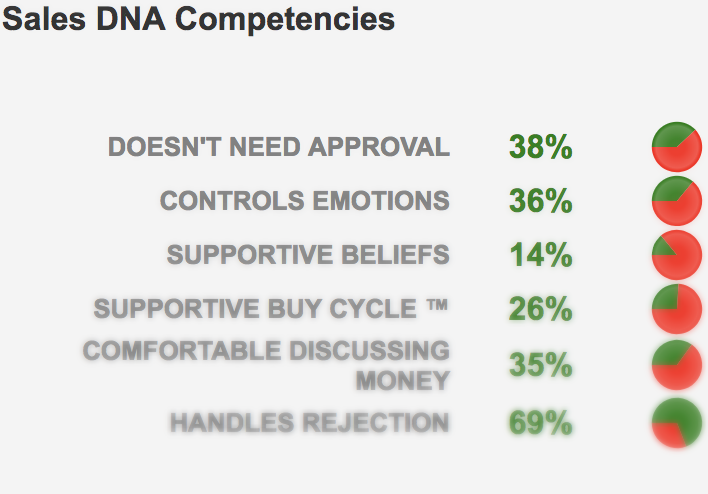
In general, salespeople use these beliefs to justify certain behaviours or the absence of specific activities. Concretely, these limiting beliefs cause representatives to execute the sales process inefficiently.
Examples of limiting beliefs
- I don’t have time to prospect
- It’s normal to encounter sales objections
- If prospects are happy with their current vendor, I won’t be able to close them
- I can’t sell without marketing collateral
- I have to submit proposals to close deals
These learned ideas can be transformed into new beliefs that support sales performance.
What is a salesperson’s buy cycle?
A salesperson has a supportive buy cycle when the way he or she makes a significant purchase supports ideal sales outcomes.
Purchasing habits (or buy cycle) include all the steps and parameters that a person uses to make essential purchases. Among these steps we find:
- Doing research
- Comparison shopping
- Price shopping
- Thinking things over
Each person’s purchasing habits vary in duration and complexity.
Buying habits are part of Sales DNA because the way a representative buys dictates how they sell. Some buy cycles are healthy and will help the sales representative effectively execute the sales process at critical moments to obtain a purchase decision from the potential customer.
Conversely, if the salesperson’s buying habits do not support the sales outcome, he/she will give in to objections that make sense to them and will not be able to guide the prospect towards a decision. For example, if a rep shops around when buying a big-ticket item, he or she is more inclined to allow a prospect to shop around, resulting in an extended sales cycle, price concessions and lost sales.
74% of salespeople have non-supportive buy cycles which hinder their performance.
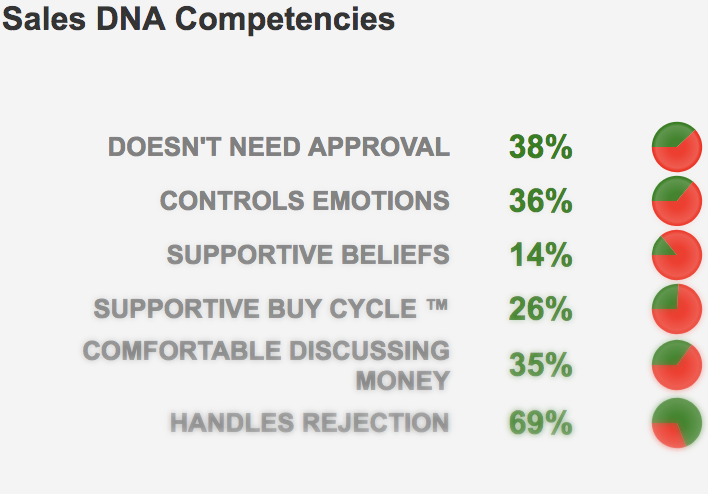
How does comfort with discussing money affect sales performance?
A salesperson needs to be able to have an in-depth conversation with prospects about money and finances.
A salesperson who is uncomfortable talking about money is much more likely to set his/her strategy based on his or her perceptions. Difficulties in addressing financial issue head-on mean that he or she will not be able to truly understand the client’s actual budget and ability to exceed it, or even if financing possibilities are available to solve the problem.
It’s safe to assume that most =clients can increase their budgets. If a representative can’t get the necessary information, they will leave money on the table.
Most salespeople (65%) aren’t comfortable talking about money.
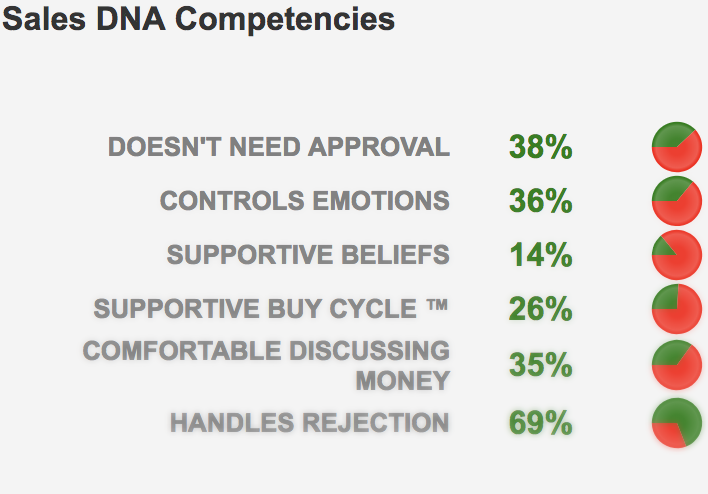
How does the ability to handle rejection impacts sales?
A salesperson who can handle rejection will immediately recover from it.
Like the ability to control emotions, sales representatives can have a difficult time managing rejection. In turn, this will impact their ability to produce sales results.
Only 31% of representatives can’t handle rejection.
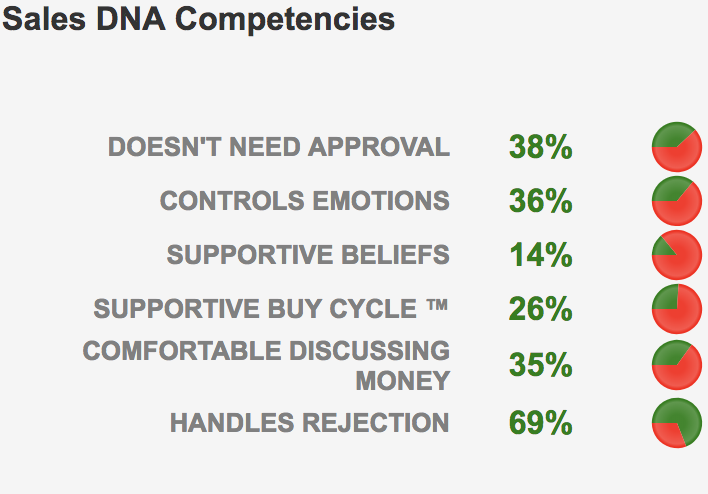
Takeaway
A team’s DNA should be the concern of every sales leader looking to build their sales force to achieve the best level of performance.
To be successful, the Sales DNA of your salespeople needs to support their the skills and abilities. A defective sales DNA will prevent the representative from functioning effectively.
The consequence for your business is a gap between the required revenue and the actual sales.
It’s vital for sales leaders to evaluate the Sales DNA of their team to understand the impact on their performance before opting for any sales training. Remember, Sales DNA will hinder any technical knowledge acquired.
Evaluating the DNA of sales candidates will allow sales leaders to recruit the best salespeople and prevent future performance problems.




